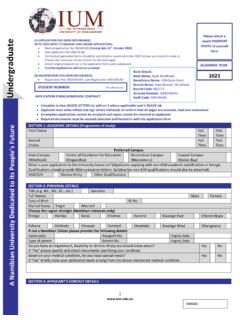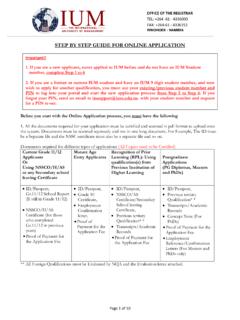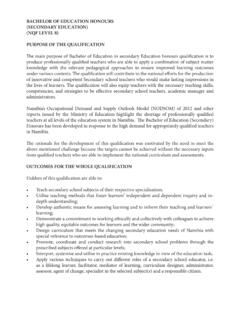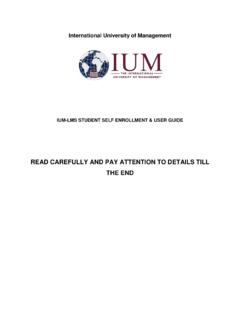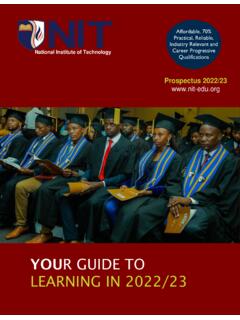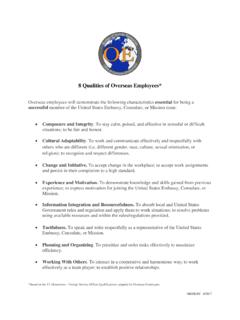Transcription of DIPLOMA IN EDUCATION (PRE AND JUNIOR PRIMARY) (NQF …
1 DIPLOMA IN EDUCATION . (PRE AND JUNIOR PRIMARY). (NQF LEVEL 7). PURPOSE OF THE QUALIFICATION. There is an urgent need for qualified pre and JUNIOR primary school teachers in Namibia. Enrolment in early childhood EDUCATION has suddenly increased and this increase is mainly due to the government initiative to help make public EDUCATION accessible to all by abolishing school fees as well as a strategic emphasis by the namibian Government to increase learner access to EDUCATION opportunities. Though the initiative is a step in the right direction, it has stressed the EDUCATION system.
2 Today there are large inequalities in educational access between rural and urban areas and a pupil-to- teacher ratio that exceeds 40:1 in some rural areas. Overall, The Ministry of EDUCATION estimates that another 5000 teachers must be trained to reach universal primary EDUCATION by 2030. Early childhood EDUCATION is a vital investment for the country's future, setting an early foundation for life-long learning for early childhood school teachers help to give young learners the best possible start in life. They inspire young learners through learning and they have a greater opportunity to relate well with learners and their parents.
3 The students studying the International University of Management DIPLOMA in EDUCATION (Pre and JUNIOR Primary) will be actively involved in their learning and development. For this qualification has been carefully designed, in collaboration with the major stakeholders, to be responsive to the needs of the profession and aims to model what outstanding teaching and learning in the pre and JUNIOR primary classroom looks like. The student learning experiences will be varied and will include educational visits, lectures, conferences, seminars, tutorials, practical workshops and independent study supported by research and online learning materials.
4 In addition to this, the students will spend a significant proportion of time on professional placement (school based studies). Assessment methods are varied according to the courses but include, among others, posters, essays, presentations and portfolios. All of these have an explicit focus on supporting each student's development as an outstanding pre and JUNIOR primary school teacher. The DIPLOMA in EDUCATION (Pre and JUNIOR Primary) will enable the students to develop a deep understanding of how learners learn. The students will learn about current initiatives and their impact on classroom practices.
5 The students will be supported in their learning to become creative and flexible practitioners prepared to make a positive impact on learners' lives and meet the needs of early childhood EDUCATION of the future. This qualification will not only meet but also implement all the requirements for training quality early childhood educators as articulated by the Ministry of Basic EDUCATION in its ministerial policy documents. Apart from aligning itself directly with the ministerial policy documents on pre and JUNIOR primary EDUCATION , this qualification considers the ever growing pool of an unqualified teachers who do not meet the present minimum requirement for entry into Bachelor of EDUCATION ( JUNIOR Primary) Honours at the International University of Management.
6 This qualification, therefore, will provide a suitable bridge for entry into Bachelor of EDUCATION ( JUNIOR Primary) Honours and further training. This qualification targets anyone who has the zeal to be become a pre and primary school teacher and has the necessary requirements to pursue this study to become a professionally qualified pre and primary school teacher in order to meet the high demand for academically and professionally qualified pre and primary school teachers in Namibia and the SADC region. OUTCOMES OF THE QUALIFICATION. Holders of this qualification are able to: identify some of the key areas associated with teaching and learning at pre and JUNIOR primary school level.
7 Identify key techniques for using songs, play and games to enhance learners's learning;. understand how different learning styles affect the way learners learn and identify different techniques for exploiting different learning styles;. define how lesson planning is linked to syllabus and curriculum and explain how the curriculum can define what and how you teach;. identify a variety of classroom management factors which affect the learning conditions in the young learner classroom;. demonstrate ability to carry out both formal assessment methods (quizzes, short tests, oral tests and worksheets) and informal assessment methods (observation of each learner's progress in learning and practice situations).
8 Provide high quality teaching of core skills (literacy, numeracy, ICT, thinking skills, problem solving);. develop in the learners an awareness of their personal learning styles and strengths and encourage them to assume more responsibility for their progress;. encourage lifelong learning;. demonstrate knowledge and understanding of learners's early childhood development process in cognitive, emotional, social, aesthetic, spiritual and ethical, and physical domains;. and demonstrate an ability to teach the whole of the JUNIOR primary school curriculum QUALIFICATION DURATION.
9 The study period for the qualification is: Fulltime/Part-time/Block release mode - Minimum: 3 Years; Maximum: 5 Years. The qualification comprises of two (2) semesters per academic year. Semester 1 runs from January to June. Semester 2 runs from July to December. COURSES. YEAR 1. 1. namibian Language EDUCATION I. 2. English for Teachers 3. Educational Foundations I. 4. Inclusive and Special EDUCATION 120. 5. Numeracy and Mathematics EDUCATION I. 6. Physical EDUCATION I. 7. Religious and Moral EDUCATION I. 8. English Language EDUCATION I. 9. Integrated Technology in EDUCATION I.
10 10. Assessment in EDUCATION 11. Guidance and Counselling 12. Arts EDUCATION I. 13. Teaching Reading with Learners' Literature I. Year course(s). 1. Micro Teaching 2. Childcare First Aid YEAR 2. 1. namibian Language EDUCATION II. 2. English Language EDUCATION II. 3. Environmental Studies EDUCATION I. 4. Integrated Technology in EDUCATION II. 5. Curriculum planning and Development I. 6. Multi-Grade Classroom Teaching 7. Teaching Phonemic Awareness and Phonics 8. Critical Thinking 9. Educational Foundations II. 10. Numeracy and Mathematics EDUCATION II.



